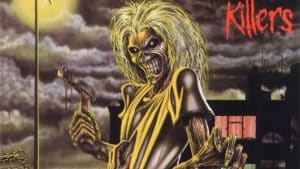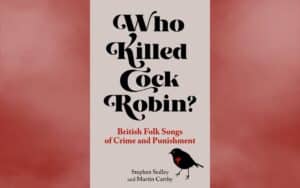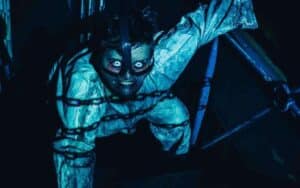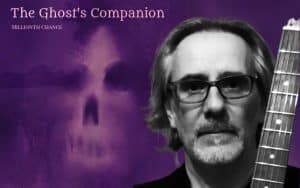CHRIS NEWTON talks to writer Adam Z. Robinson about his new musical experience, Shivers…
After two national tours of their first show, The Book of Darkness & Light, writer Adam Z. Robinson and musician Ben Styles return with Shivers, three all-new tales of chilling tales with a haunting musical accompaniment. I recently caught up with Adam for a chat about his influences, inspirations and all things spooky.
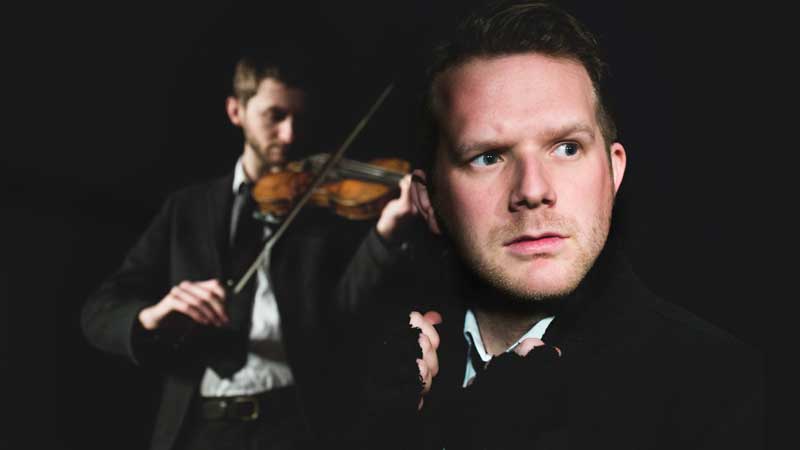
CHRIS: The telling of ghost stories is a timeless tradition. New tales crop up constantly, and the classics are retold and reimagined with each generation. Why do you think they have such enduring appeal? What is it that makes us enjoy being scared?
ADAM: Ultimately, when done well, I think ghost stories are fun. They’re tremendously enjoyable, in that ghoulish, schadenfreude-tinged way. There’s something strangely cosy about ghost stories; curling up in front of the fire with a tome of M.R James. Better yet, hearing a tale told live. We feel the thrill of being scared without facing the peril of the protagonists (that is, until, we go to turn off the light when, suddenly, everything doesn’t feel quite so safe anymore). Good Gothic fiction explores the darker sides of humanity, too, and I think that’s a bottomless well of fascination for most people. We want to peer into the darkness, if only we can find the courage to face what we might see peering back up at us…
How did you initially conceive of The Book of Darkness and Light? Did you write these stories specifically for the show, or were they already in your mind, waiting to be told?
It really was very simple: I love ghost stories. I’m completely obsessed and have been since I was a kid. An opportunity came up to tell a story in Leeds’ oldest church and it occurred to me that it would be really cool to have a single, solitary violin to accompany the tales. The thought of those haunting notes echoing around the old building felt too good to pass up. My collaboration with Ben began then, in October 2015. It seemed to fit perfectly. I was so impressed with how quickly and effortlessly the music seemed to come to him. The Book of Darkness & Light arrived almost fully formed from the first time we were in a room together.
Two of the tales in the original show began life on a blog that I used to write called Tales from the Red Barn. The Bonehouse and all of the stories in our new show, Shivers, were written very specifically to be told in this way. And, specifically, with Ben’s distinctive musical style in mind.
Your stories are wonderfully atmospheric, and put me very much in mind of the works of M. R. James and Susan Hill. Aside your literary influences, were there any real-life experiences that inspired these tales? Any local hauntings in your home town?
That’s very kind indeed, thank you! I’ve always been fascinated with true ghost stories. When I was a kid I was a little bit obsessed with books on the subject and would always pester family members for their own tales (in fact, the dream scene in ‘The Bonehouse’ was inspired by a sort-of family legend) What I try to do in TBODAL is to walk that line between the literary ghost story and the ‘anecdotal’ ghost story – tales that feel believable and ‘first hand’ but also that have the ornate language of Gothic. Occasionally we get comments after the show about whether the stories are ‘real’ or not. That always surprises me. But I take it very much as a compliment!
In your story ‘The Bonehouse’ the main character, Archie, is frequently woken at 3am. This seems to be a recurring theme in many horror films and ghostly tales. Was this a deliberate reference? If so, what is the significance of this hour?
I’m glad you noticed! In folklore, 3am – 4am is often supposed to be the Witching Hour. The time when supernatural forces are at their strongest. I think that nothing should be in any kind of writing by accident or without thought. In other words, if you include a detail it should have a purpose, however slight. The audience will find meaning in these things, in any case, and it always feels more satisfying for everyone if this is a dialogue.
I really enjoy adding little details like this to the tales. They’re small and can be easily missed, but it’s so great when people notice them. In Plagued you might have spotted that the firm of solicitors is Magnus, Alberic and Barchester – a little tribute to M.R. James. So far, only one person has told us that they spotted that. Also, on the 3am thing, we did a show in Leeds Central Library and there was a huge, gorgeous stopped clock above the stage. We asked them to change it to just after three o’clock (which they did). Afterwards, we saw a few people pointing it out to their friends as they left.
Ben Styles’ musical accompaniment to your narration adds so much to the overall performance, and feels very much like an integral part of the show rather than background music. ‘Girl, Dancing’ in particular comes across as though it was written with specific music in mind. When you are writing, which comes first, the music or the words? To what extent do they influence one another?
You’re right; Ben’s music is vital to the TBODAL shows. In our process, the stories come first. But, even when I share basic ideas with Ben I know that he is already working on them in his head. I write a new tale, we get in a room together and, essentially, we jam the way a band would. By now, we know each other’s rhythms and beats. But, we always manage to surprise each other with each new story. We sort of approach it a little like a film score. In one sense, it’s as important as what’s happening in the stories. In another, if we get it right, it almost becomes invisible and part of the fabric of the story. We’re always aiming for that seamlessness where the stories and the sounds marry together perfectly.
I bought your book after seeing the show at The Dukes Theatre in Lancaster. I thoroughly enjoyed revisiting the stories in print, although obviously it wasn’t quite the same without the violin. Any plans on releasing an accompanying soundtrack, or do you feel that would detract from the novelty of the live experience?
Thanks! I’m really glad the stories work in the written form, too. We wanted the book to be a play script, rather than just the stories, to pull back the curtain, a little, on the show. I always like that about play texts. We have recorded the soundtrack as a reward to people who supported our fundraising campaign last year. We’re talking about whether to release it at the moment…
Your new show Shivers is touring in Autumn 2018. As I understand it’s a new collection of stories from The Book of Darkness and Light. How will it differ from last year’s show?
As soon as we started working on Shivers, we realised it had a different vibe to TBODAL. The stories, we think, are scarier and more intense. It’s also a longer show – with an interval in the middle to allow people to catch their breath. The tales also include more what I suppose you might call horror tropes, too. Although the format is the same, there’s something more filmic about Shivers. If TBODAL was inspired by classic ghost story writers like M.R James, E. Nesbit, E.F. Benson, then Shivers takes its inspiration from horror cinema masterpieces like The Wicker Man, the Amicus and Hammer movies of the 70s and even contemporary films like The Blair Witch Project and The Orphanage.
The Book of Darkness and Light was initially intended as a one night only performance, but obviously went on to become a huge success. In an age of ebooks, streaming and video-on-demand, it’s interesting to see that people would still rather to go out to theatres or pubs for the simple pleasure of having a story told to them. Why do you think oral storytelling is so important?
There’s nothing quite like it, is there? I love hearing stories. It’s something we do all the time, I think, too. Telling your mate what you did at the weekend; listening to your mum over the phone talk about what’s going on with the neighbours – it’s all storytelling. There’s also something very intimate about the form, too. We played some fairly big venues on our autumn tour and we still got comments about how it felt like we were telling the stories to a single person. I also believe that the audience does half of the work. Yes, we’re using words and music to paint the picture, but there’s nothing quite as frightening as the images you create in your own head.
Shivers is a co-production with Square Chapel Arts Centre Halifax, Harrogate Theatres and LittleMighty.
Shivers Review – Harrogate Theatre, 21 January 2018.
In the tightly packed sold-out Harrogate Studio Theatre, all is darkness. The only sounds are faint, diabolic whispers until, at last, two figures are illuminated upon the stage. The Storyteller and The Musician
“We are condemned men.” The storyteller informs us, brandishing a leather-bound tome. This is The Book of Darkness and Light, a book of terrifying tales to which our performers are bound, sentenced to walk the land, sharing from its pages. They have travelled “from the forests of Bavaria, to the alleyways of Marrakesh, to the frozen wastes of Siberia… To Harrogate.” To share three bloodcurdling tales of horror with us tonight.
The audience are given one last chance to leave whilst they still can, for the sake of their immortal souls, before a haunting, sustained note from the violin ushers in the first of the stories, ‘The New Priest of Blackpines’, in which Dr. Abigail Hoffman visits her ailing brother in the North Sea Isle of Shorehollow, where the dead villagers of Blackpines are buried with their severed heads at their feet, with stones trust between their jaws. This vampiric tale echoes the legends surrounding Arnold Paole, a 16th Century Serbian, who was disinterred following his death and found to have dirt beneath his fingers and fresh blood on his lips. Gothic influences aside, this story also has a slightly Lovecraftian feel, specifically in relation to The Colour Out Of Space, in that there is a quasi-scientific plausibility to the seemingly supernatural events of Blackpines. The fact that it is presented as being Dr. Hoffman’s logbook adds to the feeling of it being an investigation, the rational scepticism of the narrator only making her discoveries more horrific.
The second story, ‘Dead Air’, is probably the stand out story of the evening, presented as the transcript of a radio phone-in, brilliantly performed alongside a pre-recorded radio host. The confessional hysteria of the caller reminded me of Psycho IV, in which Norman Bates calls a radio station to relate his life story to the DJ. I won’t spoil the plot other than to say that the caller is haunted by a family secret, a terrible phobia of telephones and that his tale is undoubtedly the most chilling of the night.
The Storyteller, Adam Z. Robinson, and The Musician, Ben Styles, have certainly delivered their promised Shivers, but the truly terrifying is saved for the final tale, ‘A Horror in Porcelain’, in which an eccentric millionaire sends his assistant to collect an antique doll. (A scenario not a million miles away from Mr. Lomax’s efforts to complete his toy collection in Psychoville. These gentlemen clearly pick their influences wisely.)
The doll in question is prized because it was once owned by a sadistic little lord, whose abuse of his childhood playthings evolved into genuine abuse in adulthood. If you’re expecting the usual haunted doll storyline, then think again. This tale has a far more horrific twist in store. This is a genuinely disturbing story, delivered with a theatrical zeal which makes heavier use of props and lighting, delivering a good few jump scares alongside the creeping dread of a story that is sure to haunt your sleepless nights.
Whereas the duo’s previous tour, ‘The Book of Darkness and Light’ gave us chilling tales with haunting melodies, it’s fair to say that ‘Shivers’ gives us a full-on performance. The music, less maudlin that its predecessor, is more cinematic, with atmospheric stabs and creepy pizzicato sections. What’s also enjoyable as a member of the audience at both shows is to witness the transformation of Adam from a writer to an actor.
Whilst the words and music are still the focus of ‘Shivers’, the props are more plentiful this time; boxes, tumblers, lanterns and, of course, an antique doll. The moment in ‘The New Priest of Blackpines’ in which The Storyteller brandishes his crucifix, it feels as though we are watching a full-blown play – albeit it a horrific one.
Ultimately the success of Shivers – as with its predecessor – is a result of the remarkable synergy between its two creators, the inseparability of the words and the music which, together, form a uniquely terrifying experience.
‘Shivers’ will be touring the rest of the UK this autumn. With this limited run at Harrogate Theatre managed to sell out each night, you would be well advised to get tickets as soon as you can.
You can watch Spooky Isles’ interview with Adam Z. Robinson’s production of A Christmas Carol here.

